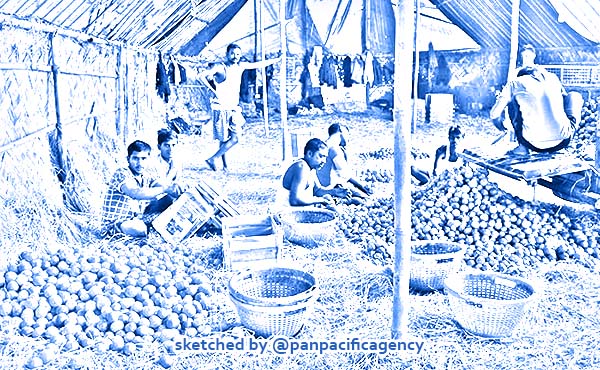Poor yield worries mandarin exporters in Gelephu

Mandarin exporters in Bhutan. Photo: Kuensel online. Sketched by the Pan Pacific Agency.
GELEPHU, Dec 17, 2019, Kuensel. There has not been enough supply this season at the orange depot above the sewerage treatment plant in Gelephu. Usually, this time around, the depot would be crowded with farmers and labourers from across the border, sorting, packing and loading consignments for export, Kuensel online reported.
An exporter from Paro, Tshering Choki, said that the business this year looked ominous. “Hopefully the supply will increase, as farmers are still collecting the fruit.”
Tshering’s family has been in the orange export business for the last three decades.
“When we moved to Gelephu three years ago, we made a good profit. Yield was good and the rate was decent,” she said. “Things have changed. The yields are decreasing annually and the rates are not improving.”
Last year, Tshering and her father sold 111 truckloads of oranges (300 boxes in a truckload and each box contains 200-250 pieces of fruit) from Gelephu.
The smaller fruits (keel) are sold at USD 15.5 per box while the bigger ones (meel) fetch USD 18.5 per box.
So far, Tshering has sent 18 truckloads to Bangladesh.
Orange export season in Gelephu generally begins by the first week of November. However, the business this season started towards the end of the month.
Many exporters said that the delay was due to the poor yield.
Another exporter, Dorji, said that there were hardly any supply flow from places like Zhemgang, Tsirang and Dagana.
He said that in the past when the harvest was low the rate shot up. “This has not happened this year. If we do not get enough loads, transportation cost would hit us hard.”
A farmer from Tsirang, Dhal Bdr Neopaney, who had just arrived at the depot with his harvest looked worried.
“Yield started falling since 2014. From 400 orange trees I had initially planted, I only have about 150 today,” he said.
From an annual income of about Nu 700,000 from orange export some four years ago, Dhal Bdr’s estimate this year is mere Nu 40,000.
Orange harvest starts from the first week of November and lasts until the end of February.
Younten Tshedup